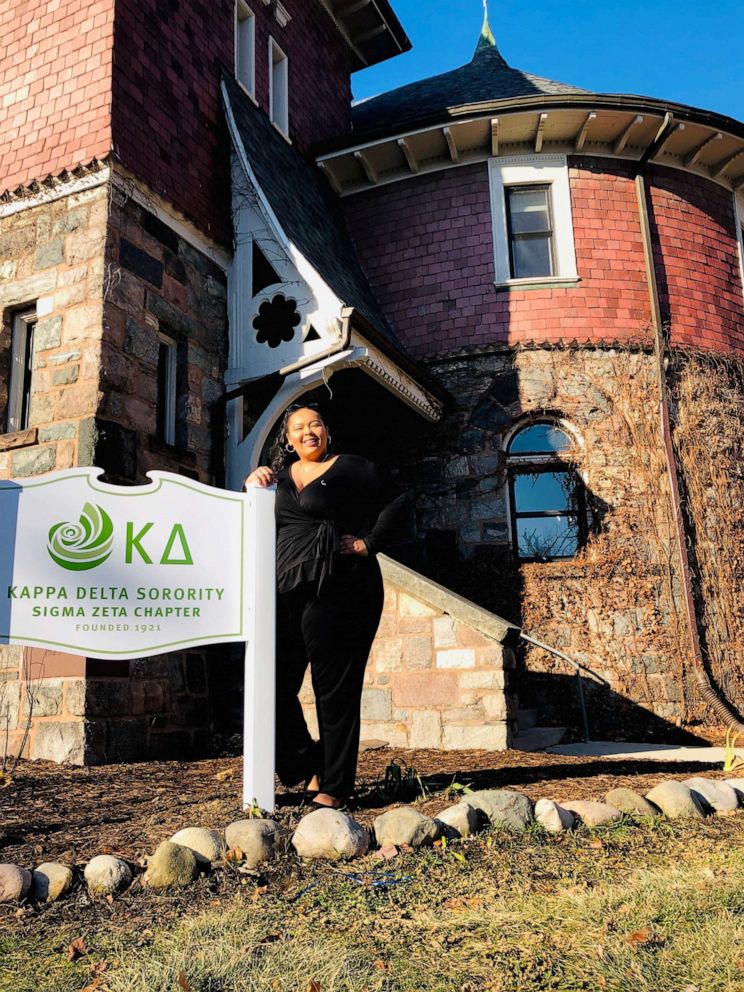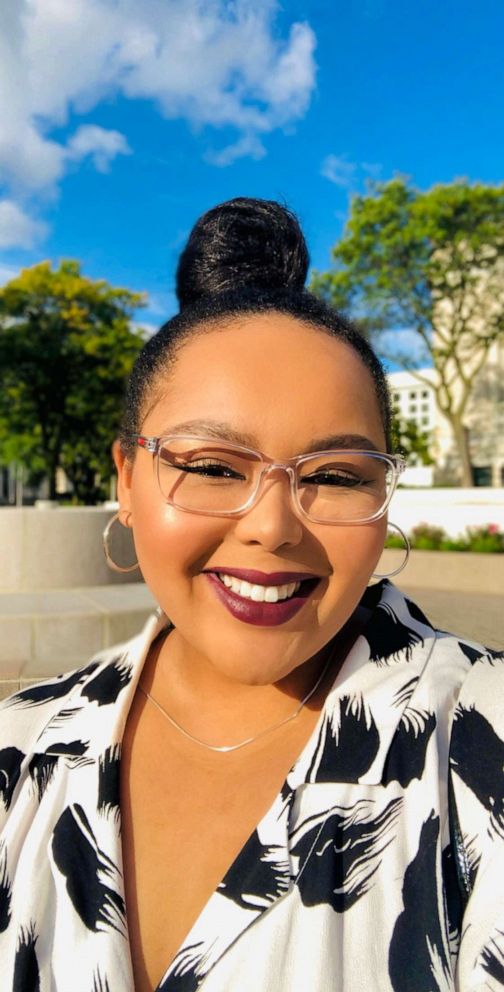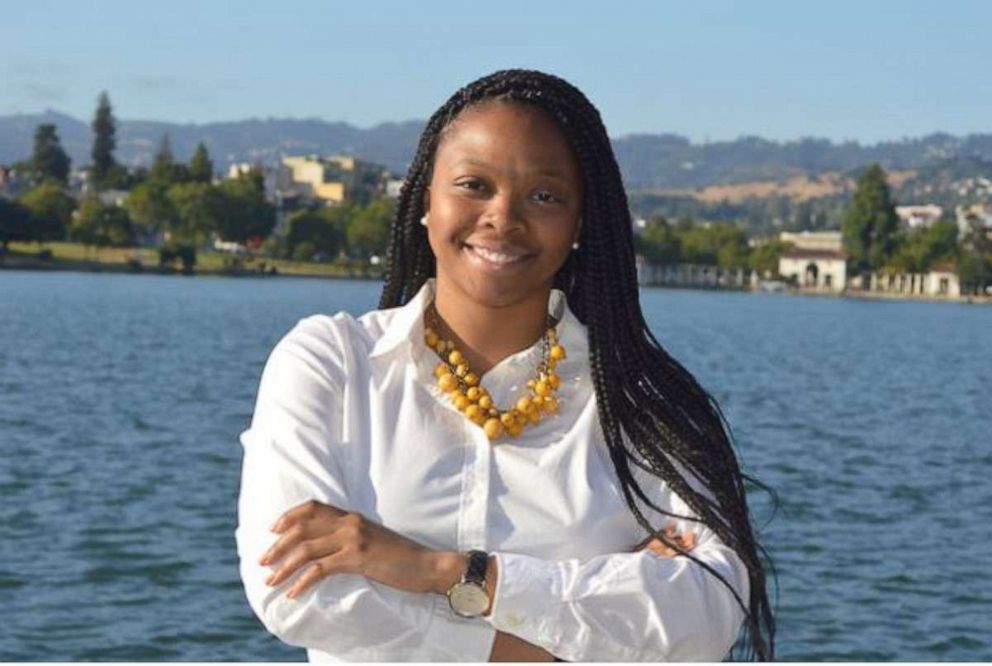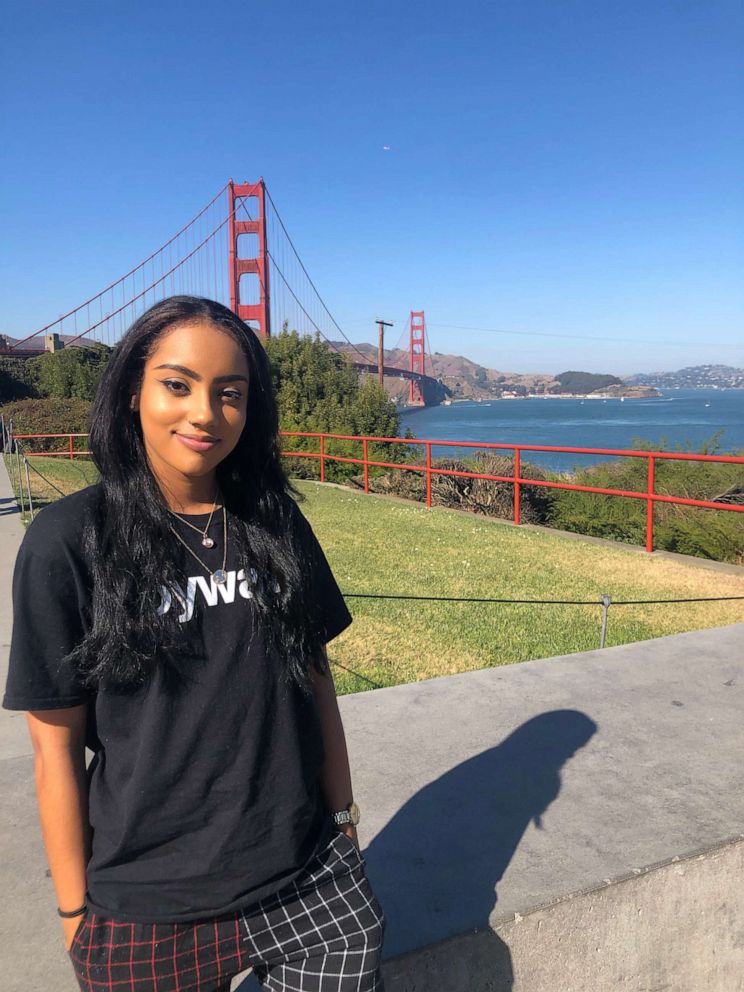'Pledge against racism': Black students talk about experiencing racism in college Greek life
"I knew it wouldn't be easy, but I definitely didn't expect this."
For some college students, participating in Greek life is seen as a way to form life-long friendships, but Kyla Brinkley said her sorority experience was tarnished by racism.
The 24-year-old from Johns Creek, Georgia, wasn't surprised to find out she was the only Black member of her pledge class when she joined the Alpha Gamma Delta chapter at the University of Georgia in 2015 as a sophomore.
"Being at a predominantly white institution, I figured, 'Why not participate in one of the main social lives?'" she told "Good Morning America."
Brinkley said she had considered pledging a Black Greek Letter Organization, or BGLO, on campus, but the sorority she wanted to join was not active at the time.

Within 16 months, Brinkley had dropped out of the sorority after she said she experienced multiple racist incidents.
One of the first conflicts occurred when one of her roommates in the sorority house bought a padlock for a closet Brinkley was supposed to share with her, preventing Brinkley from fully moving in for nearly two months. She said her family had to get Alpha Gamma Delta's national headquarters involved for the incident to be resolved because no sister was sticking up for her.
"We didn't want to make it seem like we think it's about race, but I remember feeling really uncomfortable because I felt like this wouldn't happen if I was a different member of the sorority," Brinkley recalled.
Brinkley said the main incident that led her to drop out involved sisters making puns out of the #BlackLivesMatter hashtag in 2016.
"I just thought I couldn't be a part of this organization anymore," she said, noting it had created a "hostile environment" for her.
"I didn't feel safe," she said. "I knew it wouldn't be easy, but I definitely didn't expect this."
Brinkley posted on social media about her time in the sorority house in June. She said she was moved to speak out after "seeing so many of them post about Black Lives Matter because it's popular... but I know for a fact that they weren't supportive when they could've been at the time when they had a Black sister."
Pledge Against Racism
Brinkley is not alone. She is one of more than 150 anonymous testimonials detailing racism within UGA Greek life in the new online petition "Pledge Against Racism." The petition, which launched in June and has been signed by thousands, demands the inclusion of Black and Indigenous people of color (BIPOC) in the university's Interfraternity Council, or IFC, and National Panhellenic Council, or NPC, organizations on campus. In early July, the pledge expanded to include students at Louisiana State University.
"The NPC and IFC organizations have long been another place where white populations are in the majority and able to inherently reinforce discriminatory values in favor of their own privilege and exclusivity," the petition reads.
This is another moment when young adults and people of color are speaking out about their experiences with racism while in college, especially in traditionally white fraternities and sororities, amid the heightened awareness of systemic racism in the U.S.
"Nonwhite members are not just crossing their color line with their racial identities wholly intact, but employ specific strategies of action that have repercussions for how their identities are understood and remade within the institutional spaces of both Greek and campus life," University of Connecticut professor and sociologist Matthew W. Hughey wrote in 2010 study titled "A Paradox of Participation: Nonwhites in White Sororities and Fraternities."
Racist incidents on campus have been addressed before by the university. In 2019, the UGA chapter of fraternity Tau Kappa Epsilon was suspended after a video circulated online of fraternity members using racial slurs and "engaging in behaviors that mock the suffering of enslaved peoples," a statement from the university read at the time.
While the TKE incident was captured on camera, other instances of racism are not as blatant, or were not recorded but still inflict damage, according to students involved in Greek life.
When reached out to for comment, the national headquarters for Alpha Gamma Delta, Brinkley's former sorority, directed "GMA" to its web page on diversity and inclusion commitments. There, the organization vows to "work to enact true, long-lasting change and dismantle systemic racism within our organization," divided into three categories and action items, which includes a "zero tolerance" policy on racism, providing a space for nonwhite members to share their experiences and a re-evaluation of "every aspect of our member experience." The local chapter for AGD at UGA did not provide a comment.
"I have been very proud to witness student-initiated and student-led efforts to reject racism and acknowledge and examine Greek Life in the past and present," UGA's vice president for student affairs, Victor K. Wilson, told "GMA."
Wilson added that "the current leaders of the four Greek Councils and UGA Miracle jointly expressed their resolve and outlined a plan to enhance their efforts to ensure diversity, equity and inclusion in UGA Greek Life," although a concrete plan was still "in development."
"It's bigger than Greek life, it goes wider than that," Brinkley said.
Inclusion issues don't stop with Greek life
While attending UGA, Darien LaBeach said he experienced what it was like to be a Black student in a southern town scattered with remnants of white supremacy and the Confederacy.
"It wasn't so much as overt racism as much as having to be extra conscious of the way my Black body was perceived when I went out with friends," LaBeach, 29, said.
He became known as a campus leader and was even Homecoming King, but despite these things, "there were nights that I knew I couldn't get into a bar named after a Confederate general."
Today, LaBeach says “instead of calling people out," when confronted with racist behavior or microaggressions, "I’m calling people in,” and helping to educate others on why a phrase or issue might be hurtful to BIPOC individuals.
He said he didn't do that more in college because, "I didn't want anyone to label me as a threatening Black man."
LaBeach, who now works in advertising, said he had always grown up "hyperconscious" of the color of his skin. "I didn't want it to be a hindrance," he said, an attitude which he said led to him being labeled by acquaintances as "the whitest Black person they know."
"I believed that if I was a good Black person, white people would like me more and I could be a bridge to them seeing Black people as not as threatening or a plight on society," he explained.
Although LaBeach did receive two bids from IFC organizations during his time at UGA, he never ended up joining. He said he chose to not rush a Black fraternity because he felt others would label him as "just a Black guy" and would "put me in a box I cannot get out of."
Racism goes further than just one frat, sorority or college campus
Allegations of racism in Greek life are not limited to UGA. In recent weeks, social media accounts and "#BlackAt" hashtags have emerged, highlighting students' experiences with racism. From public universities to private boarding schools, these accounts span all education levels and locations, but speak to a similar narrative of systemic racism, microaggressions and white privilege.
After BIPOC students at the University of Arkansas came forward with their experiences on social media using #BlackAtUArk, the school's Office of Enrollment released a statement, vowing to foster "an environment where Black students are supported in pursuit of their personal, academic and professional goals."
Hatred and implicit bias can thrive in any college campus, even one like Wayne State University, which prides itself on having "Michigan's most diverse campus," according to its website.
"It's not absolutely blatant [racism]… it's more microaggressions," Danielle Bennett, 20, told "GMA" about her sorority experience at Wayne State, where she said she was the only Black woman in her chapter at the time.

Bennett said she decided to post on Twitter about her experience after she saw her former sorority sisters -- who had been "blatantly racist in a group chat" -- post in solidarity of the Black Lives Matter movement.
"Until [I saw the group chat], I wasn't sure if they were being racist or if they just didn't like me," Bennett said.
"They're trying to make it seem like they are diverse and very accepting and they are not," she added. "It's just all so performative."
She later detailed her experience in a Twitter thread that has gotten the attention of Wayne State University and Kappa Delta headquarters.
Although the National Pan-Hellenic Council -- the governing body for historically Black Greek Letter Organizations, or BGLOs, which are sometimes referred to as the Divine Nine (D9) -- exists on Wayne State's campus, Bennett said she didn't have enough knowledge about them when she was rushing.
Bennett originally rushed Kappa Delta in 2017 and said she began to withdraw after financial issues to pay for sorority dues and fees made her feel excluded.
When she would begin to call people out on "disrespectful" behaviors or defend herself, she said members called her "aggressive."
Bennett said she was disciplined multiple times by the chapter's standards board for "not upholding the values" of the sorority, although she claims their reasons were always subjective.
By 2019, she disaffiliated with the organization.
"I felt like I had a target on my back," Bennett said.

Bennett said both Kappa Delta's national office and Wayne State University Dean of Students David Strauss have reached out to her since her Twitter thread went viral.
Kappa Delta's national office said they are "deeply disturbed and saddened by the concerns" raised by Bennett and the organization is "strongly committed to providing a positive experience for Black sisters and sisters of color and a supportive environment where all members can grow and thrive. We do not tolerate discrimination of any kind."
"We have a Diversity, Equity and Inclusion Committee, which will provide specific recommendations in the coming months for how our chapters can better improve in these areas. We are also developing additional education for our leaders, volunteers and members aimed at preventing bias and discrimination," the sorority noted.
Strauss, who has served as the dean of students at Wayne State since 2002, said that Bennett's claims were "very alarming" and "disappointing" to discover on social media.
"This is not who we are as a university," he told "GMA." "We value diversity and inclusion. It's in our mission statement... This was not the civility we expected [from our students]."
Strauss added that his office immediately contacted Bennett and the sorority's national office after reading about her experiences. The sorority and the university have opened an investigation into Bennett's claims to determine the next course of action for the local chapter before the school year begins.
Bennett noted that although Kappa Delta and Strauss "seemed sympathetic" to her experience, her opinions on Greek life have not changed.
"I think Panhellenic and IFC Greek life should be abolished on campus," she said. "These issues are not going to end until these organizations end."
"This is happening in other organizations. This problem runs rampant," Bennett added.
Bennett said that looking back, she wishes she had done more research on BLGOs while deciding to rush.
"BLACK GIRLS... PLEDGE D9. These white girls DO NOT and WILL NOT LIKE YOU. PERIOD," she said in one of her tweets.
Black students build vibrant community through Black Greek Letter Organizations
Whereas Brinkley and Bennett both found themselves as the only Black women in their sororities, and LaBeach said he veered away from exploring a Black fraternity because of preconceived notions that it would "put him in a box," other BIPOC students have found that BGLOs give increasing value to college campuses.
Eleise Richards, 31, chose to join a historically Black sorority because "it was embraced to take in all your Blackness."
Richards, who graduated from Howard University in 2010, said she has never regretted joining a BGLO.
"I was attracted to these organizations because the reason they exist is to have long-term impact in Black communities."

These historically Black fraternities and sororities organizations launched in the early 1900s when traditional social organizations excluded nonwhite people from joining.
"The same concepts that legalized racial segregation in America, and the power structure that caused BGLOs' founders to form these organizations, still are in place today," a 2019 study entitled "Race and Racism in Fraternity and Sorority Life" concluded.
The study by Kathleen E. Gillon, Cameron C. Beatty and Cristobal Salinas Jr. also claimed that, "the recurring themes of self-segregation, exclusion, and being the 'other' within fraternity and sorority organizations are still relevant to BGLOs at [Historically White Institutions]."
"The reason these organizations exist today is because of segregation and because we were forced out of rooms and didn't get a seat at the table," Richards said.
The 31-year-old added that while BGLOs are historically Black, the fraternities and sororities boast diverse membership.
"We were forced to self-segregate, but even then we opened the door for nonblack members."
Even though segregation is illegal, Richards said historically Black colleges and universities, or HBCUs, and BGLOs are just as important as ever, especially as more people speak out about modern-day racism and oppression of BIPOC individuals.
"It blows my mind that it's 2020 and people are just realizing racism still exists," she told "GMA."
Richards said one difference between historically white Greek life and BGLOs that she sees is that by pledging a historically Black sorority or fraternity, "you are committing yourself to being a change agent for your community for life."
Richards, who was a first-generation college student at Howard, has now become an advocate for HBCU education and Black organizations.
She encourages nonwhite students to educate themselves about these spaces and "the power of the Black community when we all come together."
"Nobody's got us like we got us," Richards said.

How to move forward
Looking back at his college career, LaBeach said it is "so frustrating" that BIPOCs in predominantly white spaces feel like "we are somehow limiting ourselves by supporting our own."
Both Brinkley and LaBeach said their experiences in college have led them to become more vocal about inclusion and diversity on a wider level.
Brinkley, who now works for a PR company in Los Angeles, said she looked for a company that actively champions diversity and heads up initiatives to further that culture in their office.
LaBeach, who is the director of "diversity, equity and inclusion strategy" at his advertising agency, said he recognizes "that I have the opportunity to hold doors open for people who look like me."
"I want to make sure that people who look like me have an easier time than I did," he said.
Although Bennett and Brinkley do not regret going public about their stories in sororities, Brinkley said the onus "should not be on Black people to speak up about their experiences" in order for people to take the issue of racism in Greek life seriously. She added that white allies need to be more vocal about these issues in order to prevent this from happening to other students in the future.
"White people are the majority, so it should be up to them to make it a welcoming environment," Brinkley said.




